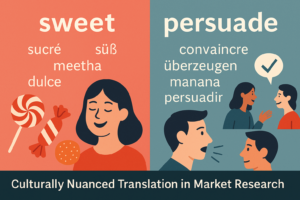The Sweet Art of Persuasion: Why Culturally Nuanced Translation Matters in Market Research
15th April 2025

At Foreign Tongues, we believe language is more than just a tool—it is a window into culture, thought and emotion. Nowhere is this more critical than in the translation of market research surveys, where the aim is not merely to transfer words between languages, but to capture the subtle interplay of meaning, tone and cultural resonance.
To understand why culturally intelligent translation matters so deeply, let us begin with a deceptively simple example: the English words “sweet” and “persuade.” At first glance, they may seem unrelated—one evokes taste and affection, the other influence and argument. Yet both trace their roots back to the same ancient source: the Proto-Indo-European root swād- meaning “sweet” or “pleasant.”
This etymological connection is more than linguistic trivia. It reflects a deeply human truth: that the act of persuasion, at its most effective, is grounded in what is pleasurable, agreeable and attuned to the audience’s values and desires. This insight, buried in the structure of our language, lies at the heart of good market research—and even better translation.
Why Cultural Nuance is Crucial
When companies conduct international market research, they are trying to understand how people think, feel and act in different markets. Surveys are often the go-to method—but translating these instruments literally can lead to misleading data or even alienate respondents.
Let us say a British survey asks consumers whether a product “feels indulgent.” Translating this phrase directly into German, Hindi or Polish might result in interpretations ranging from “sinful” to “unnecessary” to “luxurious,” depending on cultural norms and linguistic subtleties. Each of these meanings could significantly influence how a respondent answers—and thus, how a company interprets the market.
That is where we come in. At Foreign Tongues, we do not just translate words; we interpret intent. We work with native-speaking translators and cultural consultants who understand how a question is likely to land in different linguistic and social contexts. Our goal is to preserve the “sweetness” of the original message—the emotional tone, the persuasive pull—without distorting meaning.
The Swād Principle in Practice
Returning to swād, we see that even in ancient languages, pleasure and persuasion were intertwined. In Sanskrit, for example, svāda means “taste” or “relish,” while in Latin, the root gave rise to suavis—“agreeable,” “charming”—the origin of the English “suave.” These are not just historical coincidences; they are reflections of how deeply language and perception are connected.
Imagine you are conducting a market survey for a new soft drink in Spain, India and the UK. The word “sweet” may have different implications: in English, it can connote nostalgia and comfort; in Hindi, meetha may suggest tradition or even festivity; while in Spanish, dulce might have romantic or even spiritual undertones. A culturally attuned translator understands these shades of meaning and will adjust questions accordingly to ensure responses are comparable and contextually valid.
Now consider a survey that asks consumers how “persuasive” they find a brand’s messaging. In some languages, a direct translation may sound overly forceful or even manipulative. A better approach may be to convey the idea of “compelling” or “trust-building”—translations that carry the same persuasive power, but with the right cultural flavour.
From Language to Insight
Accurate data collection depends on people understanding the questions being asked—not just the words, but the underlying concepts. When survey language feels foreign or poorly adapted, respondents are less likely to engage thoughtfully. Worse, they may answer inaccurately, leading to flawed insights and costly business missteps.
Culturally intelligent translation mitigates these risks. Our translators are fluent in both the language and the culture, so we ensure your research instruments are not only understood but felt. This emotional and cognitive fidelity is essential if your research is meant to influence product development, branding or strategic decision-making.
Beyond Words: The Role of Cultural Empathy
In the end, good translation is an act of empathy. It involves understanding how people see the world—and how language reflects that worldview. The root swād reminds us that persuasion begins with pleasure, with resonance, with understanding. If you want to persuade someone, you must first speak their language—not just linguistically, but culturally.
At Foreign Tongues, we help companies do just that. Whether you are conducting qualitative interviews in Brazil, consumer satisfaction surveys in South Korea or brand perception studies across Europe, we make sure your message is not just translated—it is transformed with care, cultural insight and strategic intent.
Because in global research, sweet words are not enough. They must also be persuasive.
Ready to speak your market’s language? Let Foreign Tongues help you craft research that resonates across cultures.
